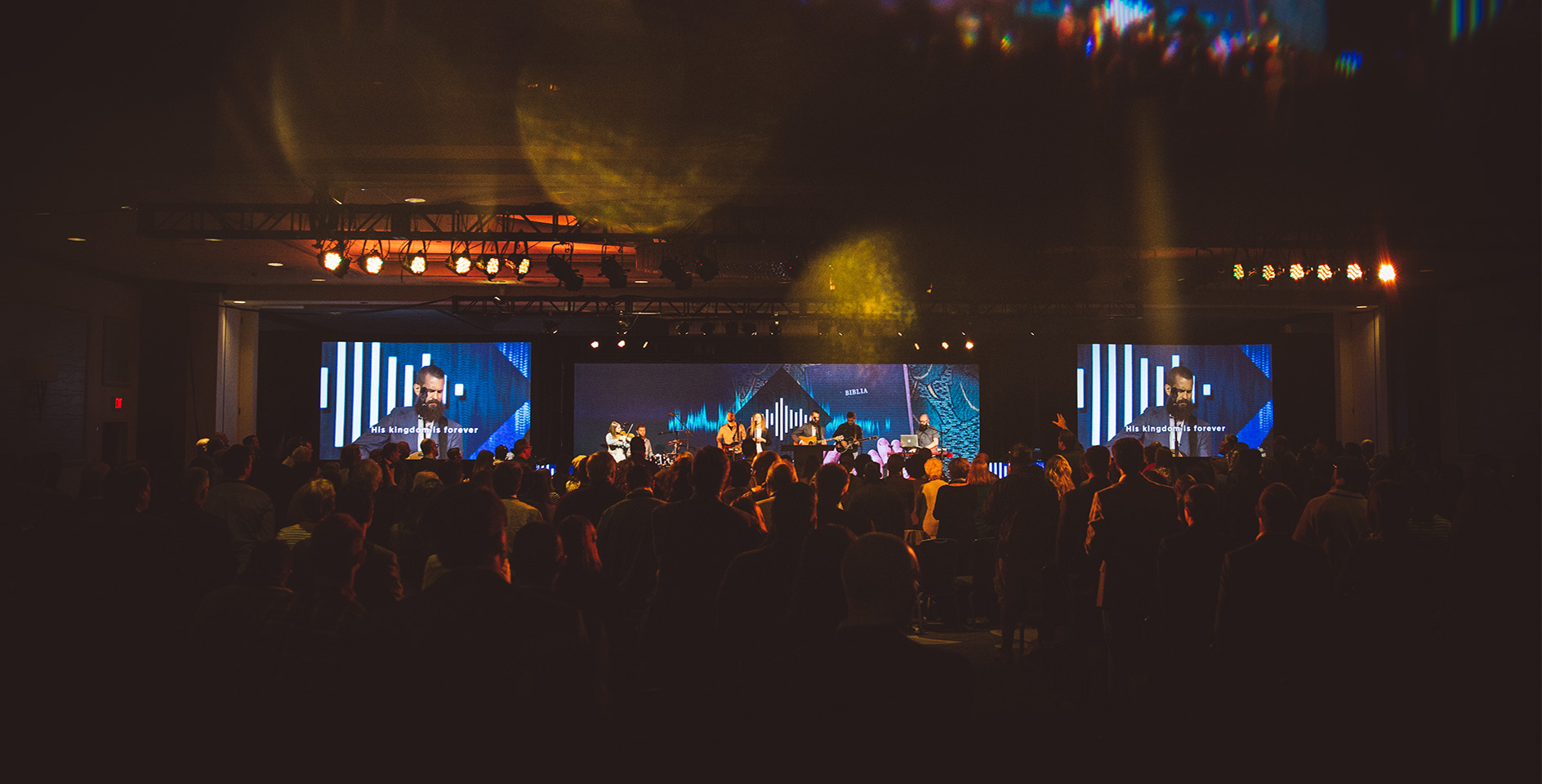“Your presence makes a great statement to the culture that we are willing to defend life,” said Focus on the Family’s Jim Daly as he—along with ERLC president Russell Moore—welcomed hundreds to Evangelicals for Life.
Before the speakers and panelists ascended the platform for the afternoon and evening sessions, he reminded the attendees, “We’re on the winning side… remember we should have a heavy heart for those in the abortion industry…. No one is beyond the reach of God. We, ourselves, are sinners are saved by grace. Pray that the light and truth of God’s word will reign in their hearts.”
Human Dignity and the Gospel: The Framework for a Lasting Mission (Russell Moore)
“We have a different view from the rest of the world about what it takes to matter,” Moore said in the first address, imploring the hundreds in attendance to examine, biblically, what it means to matter and to understand the role of “power” in the Kingdom of Christ.
Debunking the widely-believed myth that children are a burden, Moore described them as an integral part of Jesus’ mission—a mission for which he will equip those he calls.
“We are a church of crucified sinners who know the way of the cross is a hard and different way,” he said. “Loving someone and looking outside of oneself will bring risk, pain, hurt and worry—and it is worth it.”
Pro-Life Apologetics: Arguments from Reason that Align with Scripture (Scott Klusendorf)
“All of us need to be prepared to make a case for life, said Scott Klusendorf, president of Life Training Institute, who presented the basic pro-life argument and addressed three key questions Christians should consider when defending the sanctity of life.
This basic pro-life argument included the following points:
- It’s wrong to intentionally kill innocent human beings
- Abort intentionally kills innocent human beings
- Therefore, abortion is wrong
Here are the three key questions the pro-life community should be able to address when explaining their position:
- Who are the unborn? Whole, distinct, living human beings.
- What makes human beings valuable? We (born and unborn) equally share the image of our Maker. There are four differences between these two groups: Size, level of development, environment and degree of dependency.
- Why are we prolife? Because the science of embryology says at the earliest stage of development we are distinct, whole and living human beings. None of these distinctions are good reasons for killing the unborn.
A Voice for Human Dignity: The Church’s Pro-Life Mission (Todd Wagner)
“We have church leaders who have not carried out their charge from God to be a truth telling voice … If there is a problem in our country, there is a pulpit problem,” said Todd Wagner, founding pastor of Watermark Church, explaining that society is often reflective of church leadership.
While Wagner addressed the state of our nation in terms of valuing life, he cautioned against leaving human dignity to legislation: “Our country will not be changed by politics; it will be changed when people (hearts) change.”
In order this to happen he said the church must “be full of loving kindness as it seeks justice.”
Panel: Leading Congregations Who Advocate for the Weak, Vulnerable and Voiceless (Trillia Newbell—moderator, Kevin Smith, Todd Wagner, Tony Merida, Glenn Packiam)
This panel, comprised of pastors, explained why it is important for church leaders to facilitate a culture of advocacy within their churches. Here are a few of their thoughts:
- Merida: “Advocacy is one way we do neighbor love—it’s basic Christian discipleship. We need to teach or people how to love well. Also, as pastors, we have influence, which means we have an obligation to speak up for those who have no influence … and for those who don’t have a voice.”
- Pakiam: “We need to ask ourselves if the church’s presence in the community is good news for the community. Does our presence mean good news for the poor, the weak and the vulnerable?”
- Wagner: “We must be equipped to equip the saints. We need to speak up winsomely and well. Some of the ones who aren’t silent speak in a way that hurts the cause more than help it. We must speak gently and with reverence.”
- Smith: “As followers of Jesus Christ, we must value the things He values. The Body is composed of every type of person. We must endeavor to keep the unity of spirit, valuing Jesus’ prayer in John 17 that we might be one and the world may know God sent the Christ.”
Unwed Pregnancy and the Grace of God (Amy Ford)
“I felt so alone,” said Amy Ford of her unplanned pregnancy at 19 years old. “I was afraid to talk to my parents; I thought they would disown me.”
She recalled the day she showed up at an abortion clinic. Out of panic, she hyperventilated and ended up leaving the abortion clinic still pregnant. She ended up keeping the baby—a son, who is now 18.
Out of this and subsequent experiences, she formed Embrace Grace, an organization that ministers to women with unplanned pregnancies through giving, serving and discipleship.
Citing the story of the prodigal son, Ford explained that the church should welcome unwed mothers into their lives and communities, serving them out of love: “We have an opportunity to be the church.”
Bearing Burdens: Serving Special Needs Families in Our Churches (Daniel Darling—moderator, Scott Sauls, Sharen Ford, Paul Martin)
“People with special needs offer a mirror to us,” said Scott Sauls, senior minister of Christ Presbyterian Church, explaining why people with special needs a vital members of the local church. “We are a people with deep needs, who, if they aren’t met, will struggle a great deal.”
Sauls—along with Sharen Ford, Focus on the Family’s program director for adoption and orphan care efforts—said the church should be composed of listeners and observers of the needs of not just the children, but of their parents.
“When you touch the life of a (special needs) child, you touch the life of a parent,” Ford said. “To be the church is to go outside the ‘walls’ of the church—to be an advocate for the child and the parent.”
Paul Martin, senior pastor of Grace Fellowship Church—and parent of a special needs child—said that pastors should set the tone in building a culture of dignity around the special needs community.
“As church community, we understand they have limitation they are not their fault … they have limitations that require us to adapt,” he said. “God said in Scripture that it is not good to be alone, so cultivating belonging is essential.”
Race and Human Flourishing: Embracing Diversity for the Good of All People (Glenn Packiam)
Glenn Packiam, lead pastor of New Life Downton, explained how the book of Revelation offers four ways to speak of diversity: nation, tribe, people and language.
“The gospel takes our differences, different ways of belonging and gives us a truer identity,” he said. “It fits together people who remain distinct and diverse.”
Christians, who believe in the hope of resurrection, he said, should also recognize that our bodies, which will also be resurrected, reflect nations, tribes, peoples and languages—thus reflect the workmanship of our Maker.
“It isn’t just that souls matter. Bodies matter. If bodies matter, our sense of identity and belonging matter,” Packiam said. “As long as we keep being fixated on souls, we will miss the beautiful design of creation and the glorious hope of resurrection.”
So what role does diversity play in affirming the value of human life?
“We’re pro-life because we’re pro-the glory of God,” he said. “After all, that’s why diversity was built into creation… to reflect the glory of the Lord. And every life has the capacity to bring glory to God.”
Church as a Community of Life (Matt Chandler)
Matt Chandler, lead teaching pastor at The Village Church, spoke of the need for local churches to be communities of life, serious and active about the things God cares about.
He highlighted three criteria for a church to thrive as a community of life:
- A community of life believes and declares that God is the author and sustainer of all life, from womb to tomb. Because we believe this, we must be unapologetic in testifying God values all life, from the unborn to the disabled to the dying. And if he values it, we value it.
- A community of life displays compassion for their city. For the individual believer, this means getting to know our neighbors—ask to help them with a project, share a meal or host a block party. Local churches should engage the community: adopt first-year teachers, visit senior citizen homes and engage with ministries to the poor.
- A community of life actively fights for the oppressed, vulnerable and weak. This means the unborn, the disabled, the poor, the immigrant and any other marginalized group in the community. It is also vital that the church not buy into the fearful rhetoric around refugees.
Panel: What Can I Do? Confronting the Evil of Human Trafficking Around the World (Matthew Hawkins—moderator, Ashleigh Chapman, Kimberly Merida, Natasha Sistrunk Robinson and Travis Wussow)
A panel of several experts in the trenches of anti-trafficking work discussed international and domestic issues facing the church, and what individuals and groups can do to get involved and caring for this vulnerable—and large—group of people.
Key challenges identified:
- Human trafficking is widely seen as an international issue, but there are more than 100,000 Americans trafficked on American soil, by American citizens.
- Many trafficking victims don’t see themselves as such, as it is common among these victims to have already endured abuse, manipulation and coercion. When it’s all they’ve known, it’s hard to them to identify.
- A broken immigration system can allow immigrants to fall prey to traffickers.
Ways the church can engage:
- Pray consistently.
- Be prepared—have the phone number for the National Trafficking Hotline (1-888-373-7888) stored in your mobile phone.
- Invest in the Engage Together church toolkit; devise a strategic action plan for your community.
- Give financially to organizations in the fight against human trafficking.










